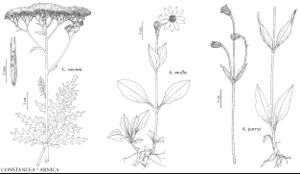Arnica parryi
Amer. Naturalist 8: 213. 1874.
Plants 15–50(–60) cm. Stems simple or branched among heads. Leaves (2–)3–4 pairs, basal and cauline (basal usually withered by flowering, petiolate or subsessile, blades ovate or nearly round to oblong-ovate, much smaller than cauline; sterile rosettes often present, proximal cauline often crowded toward stems bases); petiolate; blades broadly to narrowly lanceolate, oblong-ovate, ovate-lanceolate, or round, 4–22 × 1–6 cm, (bases obtuse or cuneate to truncate) margins usually entire, sometimes sparsely denticulate, faces scantily to moderately pilose (hairs white), adaxial sparsely stipitate-glandular (distal cauline leaves sessile, extremely reduced, nearly linear to narrowly elliptic-lanceolate). Heads (1–)3–9(–14; often nodding in bud). Involucres turbinate to narrowly campanulate. Phyllaries 8–20, linear to narrowly lanceolate. Ray florets usually 0 (sometimes peripheral florets pistillate; corollas yellow, laminae rudimentary). Disc florets 20–50; corollas yellow (1 or more lobes sometimes expanded, giving appearance of laminae); anthers yellow. Cypselae brown to black, 4–7 mm, glabrous or sparsely stipitate-glandular to densely hirsute; pappi usually stramineous, rarely tawny, bristles barbellate to ± subplumose. 2n = 38, 57, 76.
Phenology: Flowering May–Sep.
Habitat: Open conifer forests to alpine meadows
Elevation: 500–3800 m
Distribution

Alta., B.C., Yukon, Calif., Colo., Idaho, Mont., Nev., Oreg., Utah, Wash., Wyo.
Discussion
Selected References
None.
